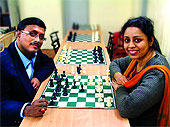 |
Mention chess to anyone who grew up in the eighties, especially in Bengal, and the first name that will spring to mind is Dibyendu Barua.
As Dibyendu struggled against an indifferent administration, lack of sponsors and personal bad patches to finally become India’s second grandmaster, there were many who found his feats symbolic of their own little struggles in their own little worlds. In short, Dibyendu was the hero for a lot of gawky kids who gave this mild-mannered youngster pride of place besides the Kapil Devs and Ravi Shastris on their bedroom walls. But Dibyendu laughs off suggestions that he was a hero to many youngsters: “Oh! I just loved playing chess. There was nothing more to it!”
In fact, Dibyendu should have been the first Indian to become a Grandmaster, considering that he had become an International Master in 1982 after meting out a shock-defeat to then world number two Victor Korchnoi. But it was a slow trawl for nine years before he could lay his hands on the coveted title. “I didn’t have anything — good books or a computer — at that time, whereas my opponents were armed to the teeth with sophisticated computers, professional coaches and other resources that made the difference. At that stage, every step forward had twice the hardship behind it,” he says.
Dibyendu’s wife, Saheli, is also a celebrity in the world of chess. Her initiation into the world of castles and queens came comparatively late — she was in the eighth standard when she was first introduced to the game. But once she took off, there was no looking back and her ascendancy to the rank of women’s International Master was a fast one.
Saheli, who gave up playing chess tournaments after marriage, has been the force behind the success of the Dibyendu Barua Chess Academy in Calcutta, as she deftly manages the academy’s operations. Together, they make the perfect chess couple, and occasional storms apart — which Saheli claims are often a result of Dibyendu’s habit of speaking his mind without giving a thought to what he’s actually saying (while Dibyendu continues to grin mischievously in the background) — seem set to script a few thrilling moves in the future!
DIBYENDU:
I first met Saheli at a simultaneous chess tournament in 1988. She was a wispy teenager back then. The participants in that tournament were mostly young and when I offered someone a chance to draw a game, they would readily accept the offer. But, during my game with Saheli, when I asked her whether she would like a draw, she refused and went ahead to win the game. I was shocked and also awed by the puny little girl’s guts — and I think that was when the seeds of admiration were sown!
Later, I’d bump into Saheli at different chess tournaments and that was how we got to know each other. In 1991, the two of us were selected for the Indian team and we represented the country at the now-defunct Lloyds Bank Tournament in London.
This was the time that we got know each other more closely. In fact, I always wanted to marry a chess player. I felt that unless my partner was a chess player, she wouldn’t be able to understand me. There have been days when, after a bad loss, I wouldn’t be able to sleep for days — I would keep on thinking about the wrong moves that I made, and this used to disrupt my routine a lot. But now, when Saheli is with me, I can share these thoughts with her and ask for her opinion. That eases my mind a lot.
One of Saheli’s major drawbacks is that she is a bit too emotional. But, otherwise, she is the best friend one can have. In fact, I really admire the way she turned my dream of running a chess academy into her own. And now I don’t know how I could have possibly managed to run the show if it hadn’t been for her.
SAHELI:
Like for any other kid of my time, Dibyendu was my idol. We read wide-eyed about his various exploits all over the world against opponents who were more fortunate and had access to better resources and we just couldn’t help but admire him.
When I first played against him at the 1988 tournament, it was like a dream come true. What was more exciting was that I had forced him onto the back foot when he offered me a draw. I was simply aghast: why should I accept a mere draw when I had the star player in my grip! I simply pressed ahead and won the game.
Later, when I met him more often, I realised what a nice person he was. The best thing about Dibyendu is that success never went to his head. He’s still a very warm, compassionate and down-to-earth guy who manages to stay cool even in the most difficult of situations. When we were branching out as young chess players, Dibyendu would always be there to offer advice and teach us tricks and tips that made a difference to how we played. Though he was a big star, he never behaved like one and always went out of his way to help others — a trait that’s still very much there in him even today.
Soon after marriage, I gave up playing chess professionally to be able to concentrate on the home front. Now I also have to look after the chess academy as this has been Dibyendu’s long-standing dream and I want it to be the best place for kids to have an understanding of this intelligent and beautiful game!
Photograph by Suvomoy Mitra










